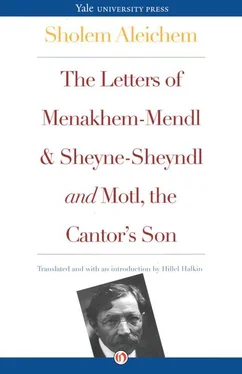Everyone is going to America. That’s what Yoyneh the bagel maker writes. He’s also on his way. In fact, he’s already at the border. It’s not the same border we ran. Ours has a bad reputation. They steal your linens there. They steal them in other places too, but they don’t hold you up at knifepoint. True, we’ve heard of borders where you’re stripped naked and robbed of everything. You aren’t killed, though. That only almost happened to us. Except that we would have died of fright first. It was our luck someone fired a gun. I must have told you about that. We can hardly remember it any more.
Not that our women aren’t still telling the world about the miracle that happened at the border. But Elye and Pinye never let them finish. They think they can tell it better. Pinye wants to write it up for the papers. He’s even begun a poem about it. I’ve told you he writes poems. This one goes:
The town of Radzivil’s the size of a yawn
With a border that has to be run before dawn—
And while you are running it thieves run away
With all that you have and leave you to say:
“Thank God that it didn’t turn out to be worse!
We might have ended our lives in a hearse
With a slit in our throats and a slash in our purse!”
Pinye says that’s just the first stanza. It will improve as it goes along. He has a poem about Brody too. And about Lemberg and Cracow, all in rhyme. He’s the very devil for rhymes, Pinye is. He’s even written some about Taybl. I know them by heart:
My beautiful Taybl
is charming and able,
a wife from a fable,
God love her!
She’d be perfect if only
she’d leave me alone
and go home to her father and mother!
How’s that for poetry? You should see Taybl blush when she hears it. Taybl blushes all the time. Brokheh sticks up for her and calls Pinye “the monster.” My mother calls him “the shlimazel.” They can’t stand his being a poet.
With Elye it’s the opposite. Elye is jealous of Pinye. He says that rhymes and songs go over big in America. Pinye has only to shmaltz them up a bit and he’ll make a fortune. There are even magazines and newspapers that will publish them in Jewish.
Pinye agrees he’ll be a success. He feels he’s made for America and America for him. That’s why he can’t wait to sail the ocean. Meanwhile, we’re stranded in Vienna.
What are we doing in Vienna? Nothing. We walk the streets a lot. What streets! And the houses! And the shop windows! They shine like mirrors. And the things that are in them! Toys. Clothes. Kitchenware. Jewelry. We stop in front of each, guessing what everything costs. The women wish they had half of it. Pinye laughs and says: “I’d settle for ten percent.”
“What’s wrong with half? Don’t be stingy!” So says Elye, stroking his beard. Elye’s beard has grown by leaps and bounds on the way to America. It looks more like a broom now. I’d love to sketch it.
I once drew Pinye’s portrait on some paper. And I drew Brokheh with a piece of chalk on a table. Did I get a licking! Brokheh said it was the spit and image of her. She hollered for Elye and he whacked me. He would have murdered me long ago if not for my mother. I get whacked each time he catches me drawing.
I’ve liked to draw since I was little. At first I drew on the walls with coal. I got whacked for that, too. Then I drew on the doors with chalk and got whacked again. Now I draw with pencil and paper. Elye says: “What’s this, more of your doodles?”
I get whacked even harder for sculpting. I like to make little pigs out of bread. Elye lets me have it when he sees them. Pinye comes to the rescue and says: “What do you want from him? Let him sculpt! Let him draw! He may grow up to be an artist.”
Elye lets Pinye have it too.
“An artist? You mean a paint smearer? You want him to decorate churches? To doodle on walls? To go around with stained hands like a greasy coachman? He’s better off singing for a cantor. God willing, I’ll apprentice him as soon as we get to America. He’s a soprano.”
“Why not teach him a trade?” Pinye says. “Americans work with their hands.”
That’s all my mother needs to hear.
“What? A common tradesman? Over my dead body will that happen to Peysi the cantor’s boy!”
She starts to cry. Pinye defends himself:
“A strange woman you are! Doesn’t it say in the Talmud that Rabbi Yohanan was a shoemaker? And that Rabbi Yitzchak was a smith? You don’t even have to go that far. My own uncle is a watchmaker and my father is a mechanic!”
That only made it worse. My mother couldn’t stop sobbing.
“I suppose that’s what my husband spent his life being such a good Jew for, a cantor! I suppose that’s why he died young — for his little boy to be a tailor or a shoemaker! And in America yet!”
“There you go again! Have you forgotten that in America you’ll need your eyes?”
That’s Elye. After a while my mother quiets down.
I don’t care what I’ll be in America. I just want to get there. I’m dying to see the place. I’ve made up my mind to learn three things there: swimming, writing, and cigar smoking. I mean I can do all three already. But I’ll do them better in America.
Even if I had been the world’s greatest swimmer, I still wouldn’t have had anywhere to swim. There’s no way you can swim in our river. Lie down in it with your belly in the mud and your feet stick up in the air. Some river! America, they say, has an ocean. If you fall asleep floating in it, the devil knows where you’ll wake up.
I can write, too, even though I never studied it. I can print all the letters in the prayer book. I make them look so real you can hardly tell the difference. It’s more like drawing than like writing. But I’d like to be able to write fast. That’s what they do in America. They do everything fast there, slam-bang. Everyone is in a hurry. I’ve heard that from the emigrants we’ve traveled with.
I know almost everything there is to know about America. People travel in trains beneath the ground and make a living. Just don’t ask me how they do it, because I have no idea. I’ll find out soon enough. I’m a quick learner. One look at anyone and I have him down pat.
Once I did a take-off of Pinye. I did the little hip-hop he walks with, and the way he looks at things like a blind man, and how he talks a mile a minute and smacks his lips. Brokheh nearly split her sides. My mother laughed until she cried. Only Elye didn’t think it was funny. He doesn’t let me do anything, Elye. I can’t figure him out. He says he loves me and he would beat me to death if my mother gave him half the chance. She tells him:
“If you want to be a child beater, have one of your own.”
Let someone else lay a hand on me, though, and Elye will tear his eyes out.
Once an emigrant gave me the “governor.” You don’t know what a “governor” is? You stick your thumb down a person’s throat and sock him so hard in the stomach that he’s ready for the Angel of Death.
The boy who gave me the governor was ten years old. Did he have a pair of hands!
I could have wished they’d dry up and fall off. He came up to me one day and asked me what my name was. “Motl,” I said. “Motl Piss-in-the-Bottle,” he says. “How come you’re calling me that?” I ask. “Because,” he says, “my name is Motl too and you’re a jerk. How would you like a governor?” “Why not?” I say. “Come a little closer then,” he says, “and I’ll give you one.” I came closer and he gave it to me. You should have seen me hit the ground. My mother began to scream. Along came Elye and beat the pants off him.
After that we became friends. Besides the governor, I learned all kinds of other things from him. Ventriloquism, for example. You don’t know what that is? It isn’t something you can learn. You have to be born with it. You shut your mouth, stand perfectly still, and bark like a dog or oink like a pig. I scared my family but good with it. Everyone began looking for a dog beneath the beds and tables. I bent down to look, too, and kept on barking. I tell you, it was a scream! In the end my brother Elye caught on and gave me a hiding. Since then I’ve given up ventriloquism.
Читать дальше












